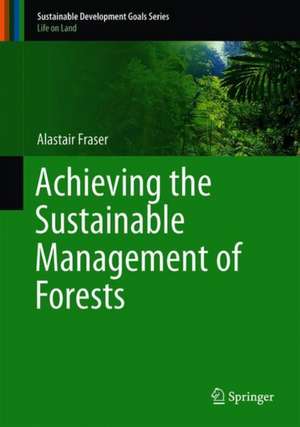Achieving the Sustainable Management of Forests: Sustainable Development Goals Series
Autor Alastair Fraseren Limba Engleză Hardback – 9 mai 2019
Din seria Sustainable Development Goals Series
- 15%
 Preț: 651.51 lei
Preț: 651.51 lei - 18%
 Preț: 1009.70 lei
Preț: 1009.70 lei - 15%
 Preț: 591.79 lei
Preț: 591.79 lei - 18%
 Preț: 726.37 lei
Preț: 726.37 lei -
 Preț: 396.40 lei
Preț: 396.40 lei - 18%
 Preț: 1009.70 lei
Preț: 1009.70 lei - 15%
 Preț: 717.45 lei
Preț: 717.45 lei - 15%
 Preț: 704.69 lei
Preț: 704.69 lei - 5%
 Preț: 997.01 lei
Preț: 997.01 lei - 18%
 Preț: 787.15 lei
Preț: 787.15 lei - 18%
 Preț: 727.97 lei
Preț: 727.97 lei - 15%
 Preț: 641.71 lei
Preț: 641.71 lei - 5%
 Preț: 1056.38 lei
Preț: 1056.38 lei - 15%
 Preț: 644.18 lei
Preț: 644.18 lei - 18%
 Preț: 788.72 lei
Preț: 788.72 lei - 18%
 Preț: 736.64 lei
Preț: 736.64 lei - 18%
 Preț: 790.77 lei
Preț: 790.77 lei - 5%
 Preț: 455.95 lei
Preț: 455.95 lei -
 Preț: 172.16 lei
Preț: 172.16 lei - 18%
 Preț: 785.55 lei
Preț: 785.55 lei - 18%
 Preț: 1009.70 lei
Preț: 1009.70 lei - 18%
 Preț: 1143.85 lei
Preț: 1143.85 lei - 18%
 Preț: 1405.09 lei
Preț: 1405.09 lei -
 Preț: 283.04 lei
Preț: 283.04 lei - 15%
 Preț: 637.59 lei
Preț: 637.59 lei - 17%
 Preț: 462.63 lei
Preț: 462.63 lei -
 Preț: 363.86 lei
Preț: 363.86 lei - 18%
 Preț: 1148.61 lei
Preț: 1148.61 lei - 18%
 Preț: 1013.65 lei
Preț: 1013.65 lei - 15%
 Preț: 641.71 lei
Preț: 641.71 lei - 15%
 Preț: 645.79 lei
Preț: 645.79 lei - 18%
 Preț: 1009.70 lei
Preț: 1009.70 lei -
 Preț: 429.61 lei
Preț: 429.61 lei - 18%
 Preț: 959.98 lei
Preț: 959.98 lei -
 Preț: 427.92 lei
Preț: 427.92 lei - 18%
 Preț: 958.38 lei
Preț: 958.38 lei - 5%
 Preț: 402.65 lei
Preț: 402.65 lei - 18%
 Preț: 900.80 lei
Preț: 900.80 lei - 18%
 Preț: 957.32 lei
Preț: 957.32 lei - 15%
 Preț: 646.62 lei
Preț: 646.62 lei - 18%
 Preț: 904.74 lei
Preț: 904.74 lei - 5%
 Preț: 1130.43 lei
Preț: 1130.43 lei - 18%
 Preț: 897.65 lei
Preț: 897.65 lei - 15%
 Preț: 646.62 lei
Preț: 646.62 lei -
 Preț: 436.35 lei
Preț: 436.35 lei - 18%
 Preț: 906.33 lei
Preț: 906.33 lei - 20%
 Preț: 750.61 lei
Preț: 750.61 lei - 18%
 Preț: 737.43 lei
Preț: 737.43 lei
Preț: 952.09 lei
Preț vechi: 1161.08 lei
-18% Nou
Puncte Express: 1428
Preț estimativ în valută:
182.19€ • 191.58$ • 150.54£
182.19€ • 191.58$ • 150.54£
Carte disponibilă
Livrare economică 26 martie-09 aprilie
Preluare comenzi: 021 569.72.76
Specificații
ISBN-13: 9783030158385
ISBN-10: 3030158381
Pagini: 292
Ilustrații: XIX, 213 p. 28 illus., 27 illus. in color.
Dimensiuni: 178 x 254 mm
Greutate: 0.64 kg
Ediția:1st ed. 2019
Editura: Springer International Publishing
Colecția Springer
Seria Sustainable Development Goals Series
Locul publicării:Cham, Switzerland
ISBN-10: 3030158381
Pagini: 292
Ilustrații: XIX, 213 p. 28 illus., 27 illus. in color.
Dimensiuni: 178 x 254 mm
Greutate: 0.64 kg
Ediția:1st ed. 2019
Editura: Springer International Publishing
Colecția Springer
Seria Sustainable Development Goals Series
Locul publicării:Cham, Switzerland
Cuprins
Chapter1. Introduction.- Chapter2. The definition and meaning of sustainable forest management.- Chapter3. The reasons for the lack of sustainably managed forests at present.- Chapter4. Policy and the political will.- Chapter5. Institutions and policy instruments required to ensure forests are managed sustainably.- Chapter6. Land rights issues and rural poverty.- Chapter7. The sustainability of biodiversity.- Chapter8. Environmental sustainability and climate change.- Chapter9. Sustainability of the supply of timber and non timber forest products.- Chapter10. Illegal logging.- Chapter11. The economics of timber and NTFPs.- Chapter12. Valuation of ecosystem services.- Chapter13. Costs of forest management and regeneration.- Chapter14. International and global issues.- Chapter15. Verification of sustainability.- Chapter16. Awareness raising among politicians and the public in general.- Chapter 17. Conclusions.
Notă biografică
Dr. Alastair Fraser has over 50 years of international experience in forest-based development, with particular interest in the links between forestry and other sectors such as environment, energy, water, industry, tourism and agriculture. He is currently an independent forestry consultant, working specifically in forest sector policy and economics and strategic planning, inter and intra-sectoral coordination and negotiation, institutional strengthening and capacity building, forest management, wood based industry and energy development and climate change issues, project preparation and management, agroforestry, forest plantation establishment and management, conservation, and research planning and management.
Textul de pe ultima copertă
This book discusses the reality of implementing sustainable forest management measures. Rather than simply offering theoretical descriptions, the book comprehensively details how sustainably managed forests can only be achieved through the cooperation and support of foresters, politicians, business leaders, local communities, consumers of forest-based goods and services, and the general public. The book also aims to raise public awareness of the factors involved in attaining the true sustainability of forest management, and the consequences of failing to do so, as well as the current issues facing sustainable forest management such as land ownership and land-use rights, political corruption, environmental stressors, and economic pressure. In 17 chapters, the book will appeal to academics and teachers in forestry and related areas, government practitioners, development agencies, and NGOs.
Caracteristici
Countries should have a unified agency responsible for forestry that includes overseeing the forest industry and trade in forest products. It is essential to eliminate illegal logging, which means balancing demand and the sustainable supply for forest products and services. Certification and Voluntary Partnership Agreements should be based on the sustainability of forest management in a whole country not just FMUs to avoid leakage.
